Did you know that frozen vegetables can retain as many nutrients as fresh vegetables? In fact, a study published in the Journal of Food Composition and Analysis found that freezing vegetables can preserve their essential vitamins and minerals, making them a healthy and convenient option for your meals. If you’re looking for an easy way to incorporate more vegetables into your diet, frozen stir fry vegetables are the perfect solution. In this article, I’ll share some tips and tricks for creating delicious and nutritious stir-fries using frozen vegetables.
Key Takeaways:
- Frozen vegetables can retain essential nutrients, making them a healthy option for meals.
- Stir-frying with frozen vegetables is an easy way to incorporate more veggies into your diet.
- By following our tips and tricks, you can create delicious and nutritious stir-fries every time.
- Stocking up on frozen vegetables ensures you always have the ingredients for a quick and healthy meal.
- Frozen stir fry vegetables are a budget-friendly option for those looking to save money on fresh produce.
Rules for Stir-Fry
When it comes to making a delicious frozen vegetable stir-fry, following a few key rules is essential. These rules will help ensure that your stir-fry turns out perfectly every time. Let’s dive into the essential guidelines:
1. Prepare your ingredients beforehand
Before you start cooking, make sure to gather and prepare all your ingredients. This includes chopping any vegetables, mincing garlic and ginger, and measuring out sauces and spices. Having everything ready will make the cooking process smoother and prevent any mishaps along the way.
2. Get your skillet or wok sizzling hot
One of the secrets to a great stir-fry is a hot cooking surface. Heat your skillet or wok over high heat until it’s smoking hot. The high temperature will allow for quick cooking and help retain the crispness of the vegetables.
3. Use cold cooked rice
For the best stir-fry results, use cooked rice that has been cooled in the refrigerator. Cold rice is less sticky and clumpy, making it easier to combine with the other ingredients and ensuring a better texture in the final dish.
4. Add frozen vegetables straight from the freezer
When making a frozen vegetable stir-fry, there’s no need to thaw the vegetables beforehand. In fact, adding them straight from the freezer helps maintain their shape, texture, and nutritional value. The high heat of the skillet or wok will quickly thaw and cook the vegetables without turning them mushy.
By following these simple rules, you’ll be on your way to creating a flavorful and satisfying frozen vegetable stir-fry. Now, let’s move on to exploring the key ingredients you’ll need for your stir-fry adventure.
| Ingredients for Stir-Fry | Amount |
|---|---|
| Assorted frozen vegetables | 2 cups |
| Cooked brown rice | 2 cups |
| Scallions, sliced | 3-4 |
| Ginger, minced | 1 tablespoon |
| Garlic, minced | 3 cloves |
| Soy sauce | 3 tablespoons |
| Sesame oil | 1 tablespoon |
| Rice vinegar | 1 tablespoon |
| Red pepper flakes | 1/2 teaspoon |
| Vegetable oil | 2 tablespoons |
Now that you have all the rules and ingredients, it’s time to dive into the cooking process itself. Stay tuned for the next section, where we’ll guide you through the steps of making a perfect frozen vegetable stir-fry.
The Ingredients
To make a delicious frozen vegetable stir-fry, you’ll need a few key ingredients. These include:
| Ingredients | Quantity |
|---|---|
| Assorted frozen vegetables | 2 cups |
| Cooked brown rice | 1 cup |
| Scallions | 2, thinly sliced |
| Ginger | 1 tablespoon, minced |
| Garlic | 2 cloves, minced |
| Soy sauce | 2 tablespoons |
| Sesame oil | 1 tablespoon |
| Rice vinegar | 1 tablespoon |
| Red pepper flakes | 1/2 teaspoon |
| Vegetable oil | 2 tablespoons |
These ingredients will give your stir-fry plenty of flavor and texture.
How To Make Frozen Vegetable Stir-Fry
Making a frozen vegetable stir-fry is easy with the right steps. Follow my simple instructions to create a flavorful and satisfying meal.
Gather the Ingredients
Before you begin, make sure you have all the necessary ingredients on hand:
- Assorted frozen vegetables
- Cooked brown rice
- Scallions
- Ginger
- Garlic
- Soy sauce
- Sesame oil
- Rice vinegar
- Red pepper flakes
- Vegetable oil
Step-by-Step Instructions
-
Start by sautéing the frozen vegetables in a hot skillet or wok. This will bring out their vibrant colors and enhance their flavors.
-
Add the minced ginger, garlic, and scallions to the skillet. These aromatic ingredients will infuse the stir-fry with a delightful taste and aroma.
-
Stir in the cold brown rice. The rice will provide a hearty and satisfying base for the stir-fry.
-
Prepare the sauce by combining soy sauce, sesame oil, and rice vinegar. Pour the sauce over the vegetables and rice.
-
Cook until the sauce has been absorbed, and the flavors have melded together.
-
Now it’s time to fold in the vegetables. This ensures that they are evenly distributed throughout the stir-fry.
And there you have it! A delicious frozen vegetable stir-fry that’s flavorful and not soggy.
Experiment with different combinations of vegetables and sauces to create your own unique stir-fry. Enjoy!
The Best Stir Fry Veggies
Not all frozen vegetables are created equal when it comes to stir-frying. Each vegetable has a unique cooking time and texture that contributes to the overall taste and mouthfeel of a stir-fry. To achieve the best results, it’s important to choose the right combination of vegetables.
Here are some of the best stir fry veggies:
- Cauliflower and Broccoli: These cruciferous vegetables are packed with nutrients, but they require a longer cooking time to soften and develop a tender-crisp texture.
- Peppers: Whether it’s bell peppers or hot chili peppers, they add vibrant color and a satisfying crunch to any stir-fry. Peppers cook quickly and retain their crispness.
- Peas: Sweet and tender, peas are a classic stir-fry ingredient. They cook rapidly and bring a burst of freshness to the dish.
- Corn: Add a touch of sweetness with corn kernels. They cook quickly and provide a pleasant crunch, making them a popular choice in stir-fries.
- Edamame: These young soybeans are not only a great source of plant-based protein but also cook rapidly and lend a delightful texture to stir-fries.
In order to achieve a well-balanced stir-fry, it’s recommended to start with the vegetables that take longer to cook, such as cauliflower and broccoli, and add the quicker-cooking vegetables towards the end of the cooking process. This ensures that all the veggies maintain their ideal texture, resulting in a delicious and visually appealing stir-fry.
If you’re looking for the perfect stir fry veggies to create a colorful and flavorful dish, keep these options in mind. Experiment with different combinations to discover your own favorite stir-fry medley!
| Vegetable | Cooking Time | Texture |
|---|---|---|
| Cauliflower | 6-8 minutes | Tender-crisp |
| Broccoli | 6-8 minutes | Tender-crisp |
| Peppers | 3-4 minutes | Crunchy |
| Peas | 2-3 minutes | Tender |
| Corn | 2-3 minutes | Crunchy |
| Edamame | 3-4 minutes | Tender |
Frozen Vegetable Stir-Fry Recipe
Looking for a quick and easy dinner idea? Try this delicious frozen vegetable stir-fry recipe. Packed with flavor and nutrients, it’s a great way to enjoy a healthy meal in no time.
- Assorted frozen vegetables
- Cooked brown rice
- Scallions
- Ginger
- Garlic
- Soy sauce
- Sesame oil
- Rice vinegar
- Red pepper flakes
- Vegetable oil
Instructions:
- In a small bowl, whisk together soy sauce, sesame oil, rice vinegar, and red pepper flakes.
- Heat vegetable oil in a skillet or wok over medium-high heat.
- Add the frozen vegetables and sauté until they are just tender.
- Remove the vegetables from the skillet or wok and set them aside.
- Sauté minced ginger, garlic, and scallions in the same skillet or wok for about 1 minute.
- Stir in cold brown rice and the sauce mixture, cooking until the liquid has been absorbed.
- Finally, fold in the sautéed vegetables and cook for an additional 2-3 minutes.
- Serve hot and enjoy!
This frozen vegetable stir-fry recipe is not only easy to make but also full of flavor. Feel free to customize it by adding your favorite spices or protein options. Serve it as a standalone dish or alongside grilled chicken or tofu for a complete meal.
Stocking Up on Frozen Stir Fry Veggies
Frozen stir fry vegetables are a convenient and versatile option to have in your kitchen for quick and easy meals. Whether you have a busy schedule or simply want to save time on meal preparation, stocking up on a variety of frozen vegetables is the key to having everything you need to create a delicious stir fry at a moment’s notice.
When it comes to selecting frozen vegetables for your stir fry, there are plenty of options to choose from. Some popular choices include broccoli, cauliflower, carrots, peas, corn, edamame, and bell peppers. By having a mix of these frozen vegetables on hand, you can easily create different flavorful stir fry combinations.
Having a stocked freezer not only saves you time but also ensures that you always have the necessary ingredients for a delicious stir-fry meal. No more worrying about running out of fresh produce or making last-minute trips to the grocery store. With a variety of frozen vegetables available, you can whip up a tasty stir fry any time.
Mix and Match with Frozen Vegetables
One of the great advantages of stocking up on frozen stir fry veggies is the ability to mix and match different vegetables for an ever-changing variety of flavors and textures. You can experiment with different combinations to create new and exciting stir fry recipes.
“The Frozen vegetable aisle at the grocery store is like a treasure trove of flavorful possibilities. You can use different combinations like broccoli and carrots for a classic stir fry, or add bell peppers for a pop of color and sweetness. The possibilities are endless!”
By keeping a diverse selection of frozen vegetables, you can easily customize your stir fry according to your taste preferences or what you have on hand. Whether you want a veggie-packed stir fry or a more focused flavor profile, having a variety of frozen vegetables allows you to create a stir fry that suits your mood and cravings.
Convenience and Long Shelf Life
Stocking up on frozen vegetables has the added benefit of convenience and a long shelf life. Unlike fresh produce, which can spoil quickly, frozen vegetables can be stored for an extended period without losing their nutritional value or flavor. This makes them an excellent option for those times when you need a quick and easy meal solution.
“Having a variety of frozen vegetables in my freezer has been a game-changer. I can always count on them to be there when I need a hassle-free and nutritious meal. No more worrying about wilted veggies or food waste!”
Additionally, frozen vegetables are picked and frozen at the peak of freshness, ensuring that you’re getting the best quality produce even when it’s out of season. This means you can enjoy a wide range of vegetables all year round without compromising on taste or nutritional value.
So, next time you’re grocery shopping, make sure to stock up on an assortment of frozen stir fry veggies. Not only will you have an array of options to create delicious and healthy stir fry meals, but you’ll also enjoy the convenience and long shelf life that frozen vegetables provide.
Tips for Avoiding Soggy Vegetables
Soggy vegetables can be the downfall of a perfectly good stir-fry. But fear not, there are simple tips and tricks to ensure your vegetables stay crisp and delicious. Here are my top recommendations for preventing soggy frozen vegetables:
- Use a hot skillet or wok: When cooking frozen vegetables, it’s important to use a very hot skillet or wok. This helps to quickly thaw and cook the vegetables without turning them soggy. The high heat creates a nice sear on the vegetables, locking in their natural flavors and textures.
- Avoid overcooking smaller vegetables: Mixed vegetable bags often contain a variety of sizes. To prevent smaller vegetables from becoming mushy, take the time to sort through the bag and separate them. Alternatively, consider buying individually bagged vegetables to ensure even cooking.
By following these simple tips, you can avoid soggy vegetables and create a stir-fry that is bursting with flavor and vibrant colors. Say goodbye to mushy veggies and hello to the perfect frozen vegetable stir-fry every time!
Remember, the key to a successful stir-fry is maintaining the right balance of textures and flavors. With these tips in mind, you’ll be able to enjoy a delicious and satisfying meal with perfectly cooked vegetables. So grab your skillet, turn up the heat, and get ready to stir-fry like a pro!
Adding Variety to Frozen Vegetable Meals
When it comes to using frozen vegetables for meals, variety is key to keeping things interesting and satisfying your taste buds. There are numerous ways to incorporate frozen vegetables into your meals, allowing you to explore different flavors and textures.
1. Rice or Noodle Stir-Fries
One great way to add variety to your frozen vegetable meals is by using them in rice or noodle stir-fries. You can mix and match different vegetables to create delicious and colorful combinations. Whether you prefer classic stir-fry sauces like soy sauce and sesame oil or you like to experiment with unique flavors, the possibilities are endless.
2. Vegetable Soups and Sauces
Frozen vegetables are also perfect for making flavorful vegetable soups and sauces. Whether you’re making a hearty minestrone soup or a creamy vegetable sauce for pasta, frozen vegetables can add a burst of flavor and nutrients to your dishes. They are convenient to use and require minimal prep time, making meal preparation a breeze.
3. Experiment with Different Sauces and Seasonings
Another way to add variety to your frozen vegetable meals is to experiment with different sauces and seasonings. From sweet and tangy teriyaki sauce to spicy curry seasonings, you can customize your meals to suit your preferences. Don’t be afraid to get creative and try new flavor combinations to spice up your dishes.
“Adding variety to your frozen vegetable meals not only keeps your meals exciting but also ensures that you get a wider range of nutrients from different vegetables.”
By adding variety to your frozen vegetable meals, you’ll never get bored of eating the same thing. Plus, different vegetables offer a wide range of nutrients, so incorporating a variety of frozen veggies into your meals can be a great way to boost your overall nutrient intake.
So, the next time you’re preparing a meal using frozen vegetables, don’t be afraid to get creative and explore different flavors and combinations. Whether it’s a rice stir-fry, a vegetable soup, or a unique sauce, there are endless possibilities to keep your frozen vegetable meals interesting and delicious.
Variety Ideas for Frozen Vegetable Meals
| Meal Ideas | Description |
|---|---|
| Rice Stir-Fry | Mix and match your favorite frozen vegetables for a quick and flavorful rice stir-fry. |
| Noodle Stir-Fry | Toss your preferred frozen vegetables with noodles and a savory sauce for a tasty stir-fry. |
| Vegetable Soup | Use frozen vegetables to enhance the flavor and nutritional value of your homemade vegetable soup. |
| Veggie Pasta Sauce | Create a delicious and healthy pasta sauce using a medley of frozen vegetables. |
| Roasted Veggies | Toss frozen vegetables with olive oil, herbs, and spices, then roast them for a flavorful side dish. |
Benefits of Frozen Stir-Fry Veggies
When it comes to cooking quick and healthy meals, frozen stir-fry vegetables offer numerous benefits that make them an excellent choice. Let’s take a closer look at the advantages of using frozen vegetables for your stir-fry dishes:
1. Convenience
One of the major benefits of frozen stir-fry vegetables is their convenience. You can store them in the freezer for an extended period, making them readily available whenever you need them. With frozen veggies on hand, you can whip up a delicious stir-fry in no time, without the need for frequent grocery trips.
2. Nutritional Value
Contrary to popular belief, frozen vegetables can be just as nutritious as their fresh counterparts, if not more so. Freezing vegetables helps to preserve their vitamins and minerals, ensuring that you still get the necessary nutrients when using them in a stir-fry. Plus, frozen veggies are typically picked and frozen at their peak ripeness, locking in maximum flavor and nutritional value.
3. Cost-Effective
Using frozen vegetables in your stir-fry can be more cost-effective compared to buying fresh produce. Frozen vegetables often come in larger quantities and can be purchased in bulk, saving you money in the long run. Additionally, there’s no wastage with frozen veggies since you can use only what you need and keep the rest for later.
“Frozen stir-fry vegetables offer convenience, nutritional value, and cost-effectiveness, making them an excellent choice for quick and healthy meals.”
With the convenience, nutritional value, and cost-effectiveness of frozen stir-fry veggies, you can elevate your cooking skills and enjoy delicious stir-fries whenever you desire. So, why not stock up on your favorite frozen vegetables and start exploring the limitless possibilities they offer?
Cooking with Frozen Stir-Fry Veggies on a Budget
When it comes to cooking with frozen vegetables on a budget, you’ll be glad to know that it’s not only affordable but can also result in delicious and nutritious meals. Frozen vegetables are often more cost-effective than fresh produce, and you can purchase them in bulk to save even more money. By combining frozen stir-fry veggies with other inexpensive ingredients like rice or noodles, you can create budget-friendly meals that are both satisfying and flavorful.
One of the advantages of cooking with frozen vegetables is their versatility. They can be used in a variety of dishes, from stir-fries to soups and sauces. Frozen stir-fry veggies are convenient because they can be stored in the freezer for a long time, providing you with a quick and easy meal option whenever you need it. Whether you’re a college student on a tight budget or a busy professional looking for affordable and healthy meals, frozen vegetable options are a great choice.
Here are some budget-friendly frozen vegetable meal ideas to get you started:
- Frozen Veggie Fried Rice: Use leftover rice, frozen stir-fry veggies, and soy sauce to create a quick and tasty meal.
- Vegetable Noodle Stir-Fry: Cook up some noodles, sauté your favorite frozen veggies, and toss everything together with a flavorful sauce.
- Roasted Frozen Veggies: Roast a mixture of frozen vegetables in the oven with olive oil, salt, and pepper for a delicious and budget-friendly side dish.
- Vegetable Soup: Simmer frozen vegetables in a flavorful broth with herbs and spices for a comforting and affordable meal.
Cooking with frozen stir-fry veggies on a budget doesn’t mean sacrificing taste or nutrition. In fact, frozen vegetables can be just as nutritious as their fresh counterparts. Freezing helps to preserve the vitamins and minerals in the vegetables, making them a healthy choice for budget-conscious individuals.
Tips for Cooking with Frozen Vegetables on a Budget
Here are some tips to make the most of your budget-friendly frozen vegetable meals:
- Buy in Bulk: Purchasing frozen vegetables in bulk can help you save money in the long run.
- Plan Your Meals: Creating a meal plan and incorporating frozen vegetables into your recipes can help you stay within your budget.
- Experiment with Seasonings: Adding different herbs, spices, and sauces to your dishes can transform simple frozen veggies into exciting and flavorful meals.
- Opt for Store Brands: Store brands often offer more affordable options without compromising on quality.
Remember to always check the ingredient list and choose frozen vegetables without added salt or sauces to keep your meals healthy and budget-friendly.
Comparison of Frozen and Fresh Vegetable Prices
| Vegetable | Frozen (per pound) | Fresh (per pound) |
|---|---|---|
| Broccoli | $1.99 | $2.99 |
| Peas | $0.99 | $1.99 |
| Carrots | $0.79 | $1.29 |
| Bell Peppers | $2.49 | $3.99 |
As you can see from the price comparison above, frozen vegetables are generally more affordable than fresh vegetables. This price difference allows you to stretch your budget further and enjoy a variety of nutritious meals with frozen stir-fry veggies.
By cooking with frozen vegetables on a budget, you can create delicious and wallet-friendly meals that are both convenient and nutritious. Don’t let a tight budget limit your culinary creativity – get creative with frozen stir-fry veggies and enjoy tasty meals without breaking the bank.
Conclusion
Frozen stir-fry vegetables are a versatile and convenient option for quick and healthy meals. By following the tips and recipes mentioned in this article, you can master the art of cooking with frozen stir-fry vegetables and create delicious meals every time. Whether you’re looking for an easy weeknight dinner or a budget-friendly meal option, frozen vegetable stir-fry is sure to satisfy your cravings.
With a variety of frozen vegetables available, you can mix and match to create endless stir-fry combinations. From classic combinations like broccoli and carrots to unique blends like bell peppers and edamame, the possibilities are endless. Plus, frozen vegetables can be easily stored in the freezer, allowing you to stock up and have them on hand whenever you need a quick and nutritious meal.
Don’t let misconceptions about frozen vegetables hold you back. Freezing helps to preserve the vitamins and minerals in the vegetables, making them just as nutritious as fresh produce. Not only that, but using frozen stir-fry vegetables can be more cost-effective than buying fresh, making it a great choice for those on a budget. So, why not give frozen vegetable stir-fry a try and discover the convenience and deliciousness it has to offer?

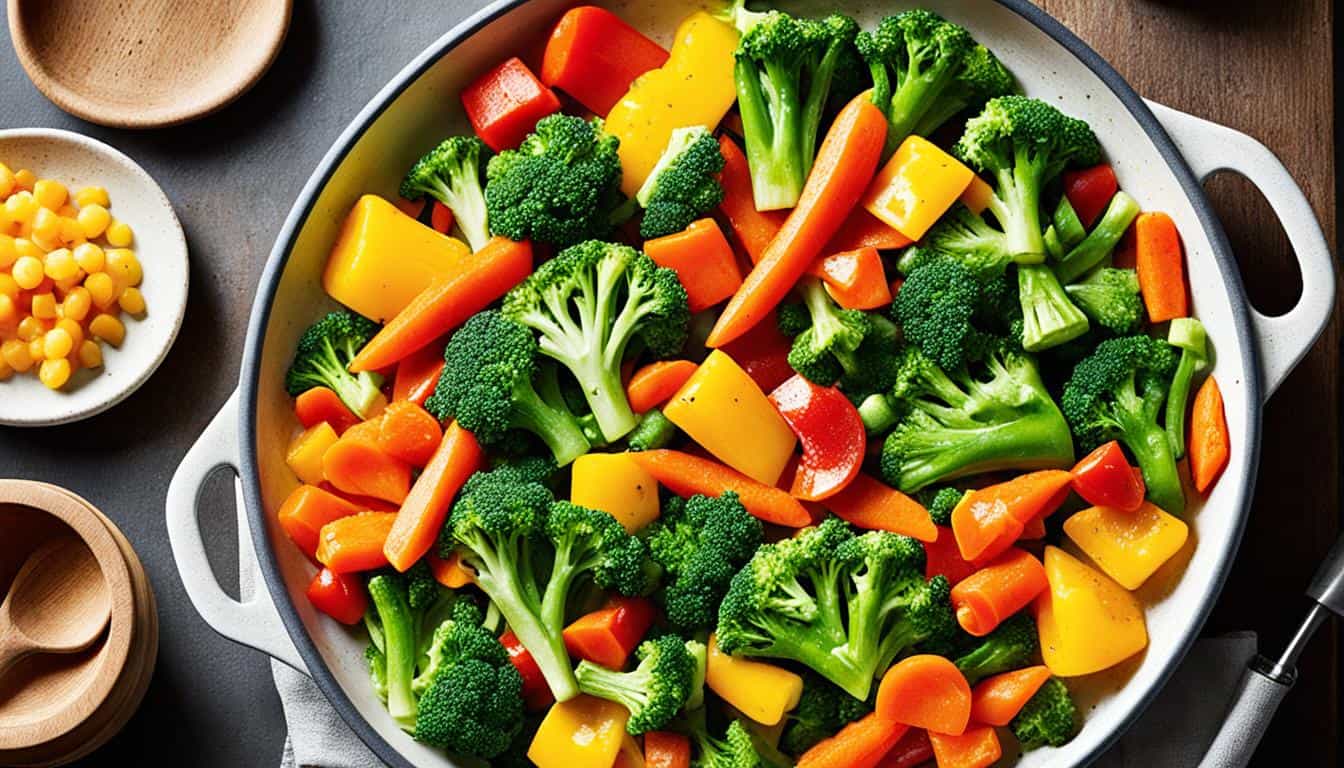
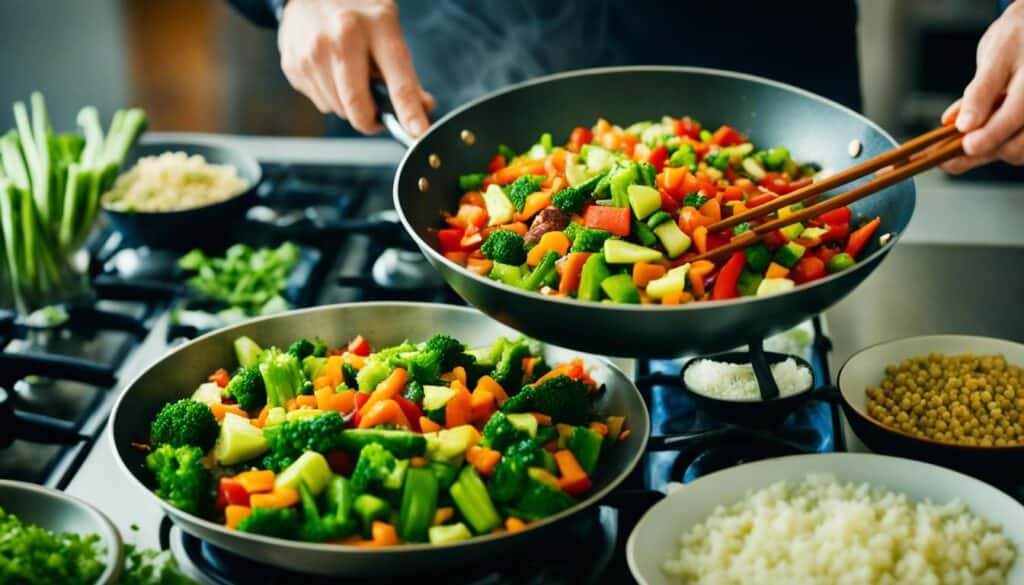
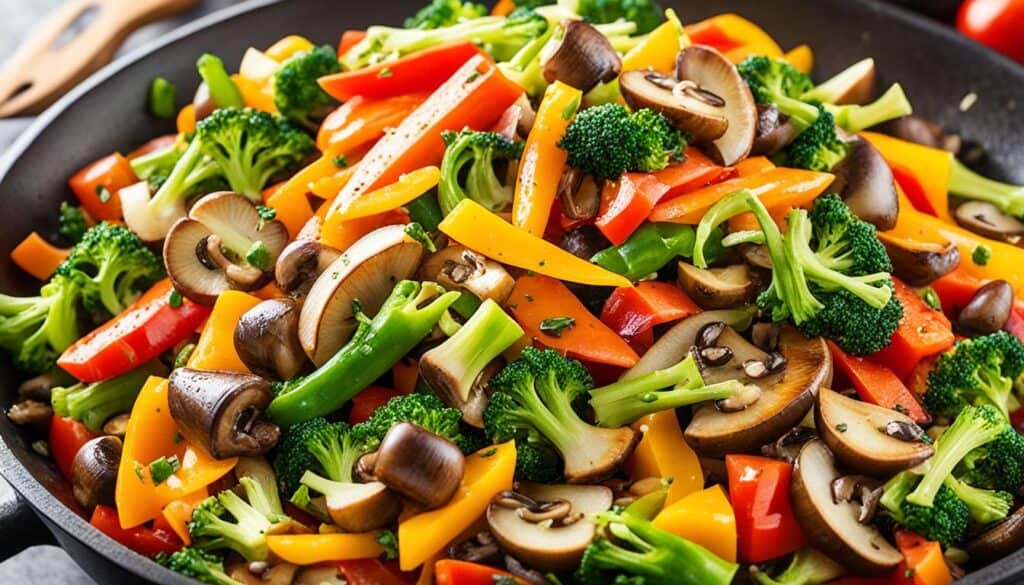
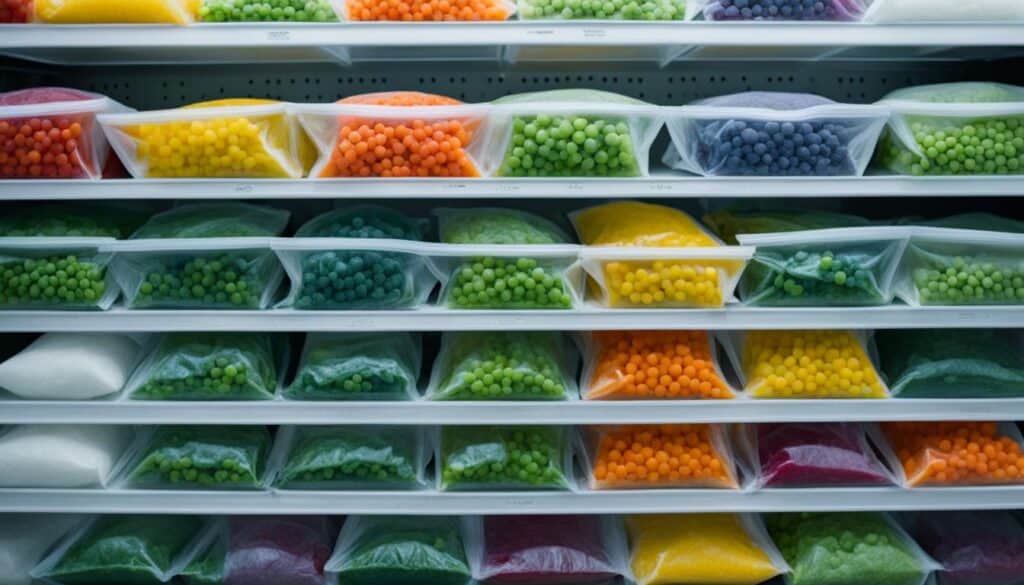
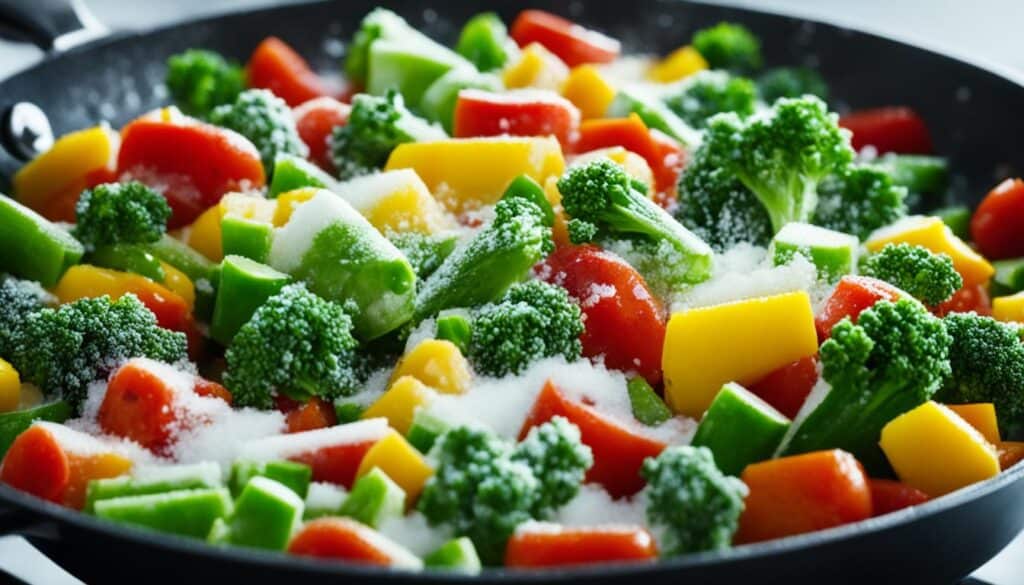
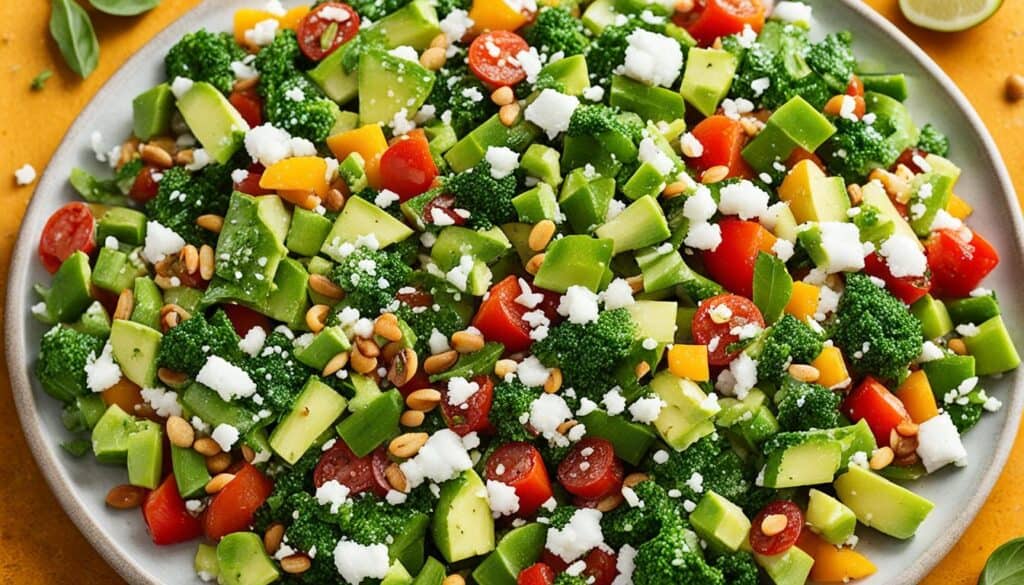



Leave a Reply